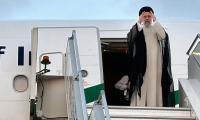The Sindh government and World Bank on Wednesday finalised two major projects for Karachi, including a programme for capacity building of municipal bodies and Yellow Line Bus Rapid Transit System (BRTS).
The development came during a follow-up meeting between Sindh Chief Minister Syed Murad Ali Shah and a four-member World Bank delegation led by its Country Director Patchamuthu Illangovan.
The first project discussed in the meeting was the urban management project, under which the donor agency will assist in introducing institutional reforms at the Karachi Metropolitan Corporation and six district municipal corporations of the city.
Under the urban management project, the World Bank aims at helping the municipal bodies explore new avenues of property tax collection. The CM informed the meeting that the provincial government had already devolved the authority to collect property tax to local governments, however, they needed a mechanism to collect the tax from their respective areas.
The World Bank also plans to bring institutional reforms at the Karachi Water and Sewerage Board (KWSB), including restructuring of its billing system. The donor agency will also provide help to the KWSB to install a 200 MGD sewage treatment plant, TP-IV, in Korangi.
The meeting also discussed the Yellow Line BRTS project. The World Bank agreed in principle to construct the entire infrastructure of the BRTS connecting Dawood Chowrangi to Numaish, covering a distance of 21 kilometres.
The CM informed the delegation that there were procurement issues in 12 ongoing World Bank projects in Sindh in various sectors including irrigation, agriculture, health, education and nutrition.
Shah said each of the 12 projects was being headed by a different project director and they all were making procurements on their own. Their procurement methods were different and time consuming, he explained and proposed establishment of a separate unit under which procurement for all the World Bank projects could be made under one umbrella.
Sindh Planning and Development Board Chairperson Mohammad Waseem suggested two options for the proposed procurement unit. The new unit can either only cover the ongoing projects or be given the domain of only new projects, he said. The meeting decided that the World Bank officers would hold another meeting with Waseem to give final shape to the projects so that they could be approved in the following meeting.
Meeting on Water Policy
The CM presided over a preparatory session for the meeting on National Water Policy that will be held today (Thursday) with Prime Minister Imran Khan in chair.
Shah said he had proposed an allocation of additional 1,200 cusecs of water for Karachi in the new policy. “Karachi is mini-Pakistan and people from all over Pakistan live here,” he remarked, adding that every province should share some of its water for Karachi.
The meeting was informed that the federal government was interested to hand Rainee Canal in the province over to the Sindh government. The canal was 10 years old and needed repair, the CM said, adding that before transferring management of the canal to Sindh, the Centre should ask the Water and Power Development Authority (Wapda) to undertake the required repair works.
The CM directed the irrigation secretary to conduct a survey of the canal’s required works and recommend the same to the Wapda. It may be noted that the Rainee Canal is 46 km long emanating from Guddu Barrage and terminating at Nara canal. It has a capacity of 5,155 cusecs and it can irrigate 400,000 acres of land.
The meeting was also told that the federal government was keen to hand Darwar Dam over to the Sindh government. The dam is located in Jamshoro district and has the capacity of 89,177 acre-feet. The CM directed the irrigation secretary to conduct a survey of the dam and report to him.
The image shows a tobacco company worker holding cigarettes. — AFP/FileHYDERABAD: An illegal cigarette factory...
This image shows the dead body. — AFP/FileAn incident unfolded in Quaidabad on Tuesday, resulting in one fatality...
Edhi Marine Services team is busy in a rescue operation in Karachi on March 17, 2024. — PPI An e-taxi driver...
Shah Abdul Latif University Khairpur building can be seen in this image. — Facebook/Shah Abdul Latif University,...
Representational image of a handcuffed man. — Pexels/FileHYDERABAD: A police operation was carried out in Hyderabad,...
A representational image showing a person handcuffed and standing behind bars. — AFP/FileThe SSGC has continued...







